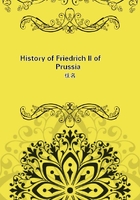
第77章
Albert was chosen Grand-Master of Preussen, in February, 1511;age then twenty-one. Made his entry into Konigsberg, November next year; in grand cavalcade, "dreadful storm of rain and wind at the time,"--poor Albert all in black, and full of sorrow, for the loss of his Mother, the good Polish Princess, who had died since he left home. Twenty months of preparation he had held since his Election, before doing anything: for indeed the case was intricate. He, like his predecessor in office, had undertaken to refuse that Homage to Poland; the Reich generally, and Kaiser Max himself, in a loose way of talk, encouraging him: "A piece of the Reich," said they all; "Teutsch Ritters had no power to give it away in that manner." Which is a thing more easily said, than made good in the way of doing.
Albert's predecessor, chosen on this principle, was a Saxon Prince, Friedrich of Meissen; cadet of Saxony; potently enough connected, he too; who, in like manner, had undertaken to refuse the Homage. And zealously did refuse it, though to his cost, poor man. From the Reich, for all its big talking, he got no manner of assistance; had to stave off a Polish War as he could, by fair-speaking, by diplomacies and contrivances; and died at middle age, worn down by the sorrows of that sad position.
An idea prevails, in ill-informed circles, that our new Grand-Master Albert was no better than a kind of cheat; that he took this Grand-Mastership of Preussen; and then, in gayety of heart, surreptitiously pocketed Preussen for his own behoof. Which is an idle idea; inconsistent with the least inquiry, or real knowledge how the matter stood. [Voigt, ix. 740-749; Pauli, iv. 404-407.]
By no means in gayety of heart, did Albert pocket Preussen;nor till after as tough a struggle to do other with it as could have been expected of any man.
One thing not suspected by the Teutsch Ritters, and least of all by their young Hochmeister, was, That the Teutsch Ritters had well deserved that terrible down-come at Tannenberg, that ignominious dismissal out of West-Preussen with kicks. Their insolence, luxury, degeneracy had gone to great lengths. Nor did that humiliation mend them at all; the reverse rather. It was deeply hidden from the young Hochmeister as from them, That probably they were now at length got to the end of their capability: and ready to be withdrawn from the scene, as soon as any good way offered!--Of course, they Were reluctant enough to fulfil their bargain to Poland; very loath they to do Homage now for Preussen, and own themselves sunk to the second degree. For the Ritters had still their old haughtiness of humor, their deepseated pride of place, gone now into the unhappy CONSCIOUS state. That is usually the last thing that deserts a sinking House: pride of place, gone to the conscious state;--as if, in a reverse manner, the House felt that it deserved to sink.
For the rest, Albert's position among them was what Friedrich of Sachsen's had been; worse, not better; and the main ultimate difference was, he did not die of it, like Friedrich of Sachsen;but found an outlet, not open in Friedrich's time, and lived.
To the Ritters, and vague Public which called itself the Reich, Albert had promised he would refuse the Homage to Poland; on which Ritters and Reich had clapt their hands: and that was pretty much all the assistance he got of them. The Reich, as a formal body, had never asserted its right to Preussen, nor indeed spoken definitely on the subject: it was only the vague Public that had spoken, in the name of the Reich. From the Reich, or from any individual of it, Kaiser or Prince, when actually applied to, Albert could get simply nothing. From what, Ritters were in Preussen, he might perhaps expect promptitude to fight, if it came to that; which was not much as things stood. But, from the great body of the Ritters, scattered over Germany, with their rich territories (BALLEYS, bailliwicks), safe resources, and comfortable "Teutschmeister" over them, he got flat refusal: [The titles HOCHMEISTER and TEUTSCHMEISTER are defined, in many Books and in all manner of Dictionaries, as meaning the same thing.
But that is not quite the case. They were at first synonymous, so far as I can see; and after Albert's time, they again became so;but at the date where we now are, and for a long while back, they represent different entities, and indeed oftenest, since the Prussian DECLINE began, antagonistic ones. Teutschmeister, Sub-president over the GERMAN affairs and possessions of the Order, resides at Mergentheim in that Country: Hochmeister is Chief President of the whole, but resident at Marienburg in Preussen, and feels there acutely where the shoe pinches,--much too acutely, thinks the Teutschmeister in his soft list-slippers, at Mergentheim in the safe Wurzburg region.] "We will not be concerned in the adventure at all; we wish you well through it!"Never was a spirited young fellow placed in more impossible position. His Brother Casimir (George was then in Hungary), his Cousin Joachim Kur-Brandenburg, Friedrich Duke of Liegnitz, a Silesian connection of the Family, ["Duke Friedrich II.:" comes by mothers from Kurfurst Friedrich I.; marries Margraf George's Daughter even now, 1519 (Hubner, tt. 179, 100, 101).] consulted, advised, negotiated to all lengths, Albert's own effort was incessant. "Agree with King Sigismund," said they; "Uncle Sigismund, your good Mother's Brother; a King softly inclined to us all!"--"How agree?" answered Albert: "He insists on the Homage, which I have promised not to give!" Casimir went and came, to Konigsberg, to Berlin; went once himself to Cracow, to the King, on this errand: but it was a case of "Yes AND No;" not to be solved by Casimir.